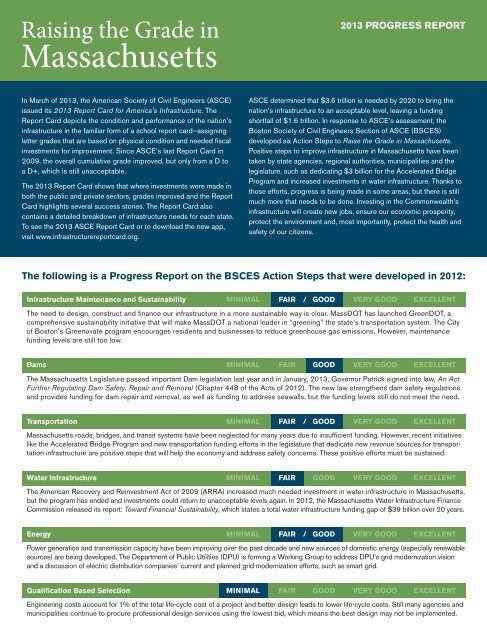2013 Progress Report - BSCES
2013 Progress Report - BSCES
2013 Progress Report - BSCES
Create successful ePaper yourself
Turn your PDF publications into a flip-book with our unique Google optimized e-Paper software.
Raising the Grade inMassachusetts<strong>2013</strong> PROGRESS REPORTIn March of <strong>2013</strong>, the American Society of Civil Engineers (ASCE)issued its <strong>2013</strong> <strong>Report</strong> Card for America’s Infrastructure. The<strong>Report</strong> Card depicts the condition and performance of the nation’sinfra structure in the familiar form of a school report card—assigningletter grades that are based on physical condition and needed fiscalinvestments for improvement. Since ASCE’s last <strong>Report</strong> Card in2009, the overall cumulative grade improved, but only from a D toa D+, which is still unacceptable.The <strong>2013</strong> <strong>Report</strong> Card shows that where investments were made inboth the public and private sectors, grades improved and the <strong>Report</strong>Card highlights several success stories. The <strong>Report</strong> Card alsocontains a detailed breakdown of infrastructure needs for each state.To see the <strong>2013</strong> ASCE <strong>Report</strong> Card or to download the new app,visit www.infrastructurereportcard.org.ASCE determined that $3.6 trillion is needed by 2020 to bring thenation’s infrastructure to an acceptable level, leaving a fundingshortfall of $1.6 trillion. In response to ASCE’s assessment, theBoston Society of Civil Engineers Section of ASCE (<strong>BSCES</strong>)developed six Action Steps to Raise the Grade in Massachusetts.Positive steps to improve infrastructure in Massachusetts have beentaken by state agencies, regional authorities, municipalities and thelegislature, such as dedicating $3 billion for the Accelerated BridgeProgram and increased investments in water infrastructure. Thanks tothose efforts, progress is being made in some areas, but there is stillmuch more that needs to be done. Investing in the Commonwealth’sinfrastructure will create new jobs, ensure our economic prosperity,protect the environment and, most importantly, protect the health andsafety of our citizens.The following is a <strong>Progress</strong> <strong>Report</strong> on the <strong>BSCES</strong> Action Steps that were developed in 2012:Infrastructure Maintenance and Sustainability MINIMAL FAIR / GOOD VERY GOOD EXCELLENTThe need to design, construct and finance our infrastructure in a more sustainable way is clear. MassDOT has launched GreenDOT, acomprehensive sustainability initiative that will make MassDOT a national leader in “greening” the state’s transportation system. The Cityof Boston’s Greenovate program encourages residents and businesses to reduce greenhouse gas emissions. However, maintenancefunding levels are still too low.Dams MINIMAL FAIR GOOD VERY GOOD EXCELLENTThe Massachusetts Legislature passed important Dam legislation last year and in January, <strong>2013</strong>, Governor Patrick signed into law, An ActFurther Regulating Dam Safety, Repair and Removal (Chapter 448 of the Acts of 2012). The new law strengthens dam safety regulationsand provides funding for dam repair and removal, as well as funding to address seawalls, but the funding levels still do not meet the need.Transportation MINIMAL FAIR / GOOD VERY GOOD EXCELLENTMassachusetts roads, bridges, and transit systems have been neglected for many years due to insufficient funding. However, recent initiativeslike the Accelerated Bridge Program and new transportation funding efforts in the legislature that dedicate new revenue sources for transportationinfrastructure are positive steps that will help the economy and address safety concerns. These positive efforts must be sustained.Water Infrastructure MINIMAL FAIR GOOD VERY GOOD EXCELLENTThe American Recovery and Reinvestment Act of 2009 (ARRA) increased much needed investment in water infrastructure in Massachusetts,but the program has ended and investments could return to unacceptable levels again. In 2012, the Massachusetts Water Infrastructure FinanceCommission released its report: Toward Financial Sustainability, which states a total water infrastructure funding gap of $39 billion over 20 years.Energy MINIMAL FAIR / GOOD VERY GOOD EXCELLENTPower generation and transmission capacity have been improving over the past decade and new sources of domestic energy (especially renewablesources) are being developed. The Department of Public Utilities (DPU) is forming a Working Group to address DPU’s grid modernization visionand a discussion of electric distribution companies’ current and planned grid modernization efforts, such as smart grid.Qualification Based Selection MINIMAL FAIR GOOD VERY GOOD EXCELLENTEngineering costs account for 1% of the total life-cycle cost of a project and better design leads to lower life-cycle costs. Still many agencies andmunicipalities continue to procure professional design services using the lowest bid, which means the best design may not be implemented.
What Kind of Commonwealth Do We Want to Live In?One with adequately funded infrastructure that ensures a safe and clean environment, economic growth andcompetitiveness, and a good quality of life? Or, one with a higher cost of living, unsafe transportation and watersystems, increased pollution, more delays, increased aggravation, and less productivity?Raising the Grade in MassachusettsAction StepsIn order to succeed in Raising the Grade in Massachusetts, actions must be taken to change the current mindset in the planning, design,and funding of our infrastructure. Undertaking the action steps outlined below is the responsibility of engineers, constructors, policy makers,and users of the Commonwealth’s infrastructure networks.Infrastructure Maintenance and Sustainability• Utilize life-cycle cost and benefit-cost analyses during project planning• Consider future maintenance costs when planning/funding projects• Establish dedicated maintenance accounts for infrastructure projects• Institute proactive asset management programs• Account for future climate change in design of new projects• Develop infrastructure networks utilizing a holistic approach thataccounts for regional impacts and needsDams• Support passage of Senate Bill 1985 in order to implement alow-interest loan program for dam rehabilitation/repair/removal• Strengthen dam safety regulations• Streamline the process for the removal of obsolete, unsafe damswhich pose a threat to public safetyTransportation• Develop a comprehensive cost savings, efficiencies, and newrevenue sources to close the funding gap cited in the 2007Transportation Finance Commission study• Explore all potential sources of revenue, including a gas taxincrease, tolls, VMT, fare increases, Public-Private Partnershipsand a State Infrastructure Bank• Address the MBTA funding deficit by considering impacts to othertransportation systems and the state’s economy from inadequatelyfunding the “T”• Develop a comprehensive regional, multi-modal transpor tation planWater Infrastructure• Adopt the recommendations of the 2012 Water Infra structureFinance Commission report and develop new sources of revenue• Increase funding for the Massachusetts Drinking Water StateRevolving Fund (SRF) and the Massachusetts Water PollutionAbatement Trust (MWPAT)• Dedicate funds for water conservation and source water protectioninitiatives, and encourage Enterprise accounts for communitiesthat don’t have them• Make engineering costs eligible for SRF funding• Implement the USEPA’s Integrated Planning Framework approachto ensure compliance with NPDES storm water and cleanwater requirements in a cost-effective, sustainable manner• Encourage watershed-based water infrastructure solutionsEnergy• Develop additional redundancy within the transmission grid• Increase routine maintenance required to increase reliability andto reduce weather related failures• Increase development of local renewable energy sourcesQualification Based Selection• Require Qualification Based Selection (QBS) of designprofessionals for all state and municipal funded engineeringprojects• Educate state and local Procurement offices about the long termbenefits of QBSBoston Society of Civil Engineers Section/ASCEThe Engineering Center, One Walnut Street, Boston, MA 02108Contact Information: Anthony M. Puntin, PE, Executive Director617.305.4111 • apuntin@engineers.org • www.bsces.org



